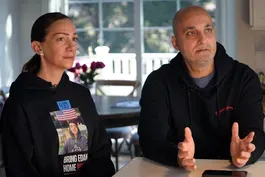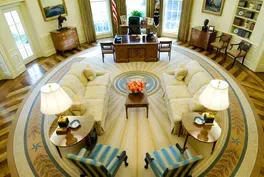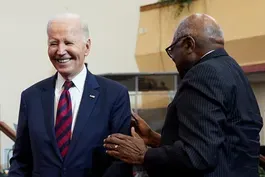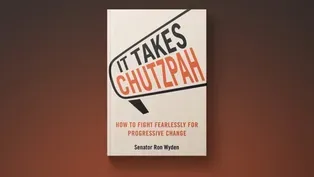
Tech and AI leaders make big donations to Trump inauguration
Clip: 1/19/2025 | 5m 42sVideo has Closed Captions
Leaders in tech, AI and cryptocurrency make big donations to Trump inauguration
President-elect Trump’s inaugural committee has smashed fundraising records, racking up more than $200 million in pledges. Donations have come from some of the world’s biggest companies, and top tech CEOs will be front and center at the festivities. Ali Rogin speaks with ethics and campaign finance expert Craig Holman and New York Times technology reporter Cecilia Kang for more.
Major corporate funding for the PBS News Hour is provided by BDO, BNSF, Consumer Cellular, American Cruise Lines, and Raymond James. Funding for the PBS NewsHour Weekend is provided by...

Tech and AI leaders make big donations to Trump inauguration
Clip: 1/19/2025 | 5m 42sVideo has Closed Captions
President-elect Trump’s inaugural committee has smashed fundraising records, racking up more than $200 million in pledges. Donations have come from some of the world’s biggest companies, and top tech CEOs will be front and center at the festivities. Ali Rogin speaks with ethics and campaign finance expert Craig Holman and New York Times technology reporter Cecilia Kang for more.
How to Watch PBS News Hour
PBS News Hour is available to stream on pbs.org and the free PBS App, available on iPhone, Apple TV, Android TV, Android smartphones, Amazon Fire TV, Amazon Fire Tablet, Roku, Samsung Smart TV, and Vizio.
Providing Support for PBS.org
Learn Moreabout PBS online sponsorshipJOHN YANG: President-elect Trump's inaugural committee has smashed fundraising records, racking up more than $200 million in pledges.
Donations have come from leaders of big tech, financial services and telecommunications.
Some of those companies have big federal contracts or are regulated by the federal government.
Ali Rogan spoke with Craig Holman, an expert on ethics and campaign finance rules for Public Citizen, and Cecilia Kang, who covers technology for the New York Times.
ALI ROGIN: Thank you both so much for being here.
Craig, you've put together a research document on the Trump-Vance inaugural Committee fundraising.
How much have they raised and who's donating?
CRAIG HOLMAN, Government Affairs Lobbyist, Public Citizen: It's shattering all records this time around.
You know, the Trump Inaugural committee originally targeted $150 million to spend on the inauguration, which by itself would break records.
Then it upped it to 200 million because money just started flowing in.
And today we know it's going to be around 250 million.
And it shatters not only all records in terms of spending, but also in terms of donations.
The donations that we're aware of at this point are all $1 million to $5 million from the same donors who used to give to previous inaugurations, Trump's first one.
But back then it was in amounts of maybe 50,000 or 100,000.
ALI ROGIN: You mentioned that it's some of the same folks.
So who tends to be high on the list?
CRAIG HOLMAN: Well, at top of this list is the cryptocurrency industry.
So we've got ripple, that's given 5 million, you got Coinbase, it's given 1 million.
You've got Kraken, that's given 1 million.
And you know, they never gave those kinds of money before.
As a matter of fact, the cryptocurrency industry rarely even invested in politics until 2020.
ALI ROGIN: Cecilia, which tech moguls are we expecting to see at the inauguration tomorrow?
And what do we know about what they might be looking to get out of this new relationship?
CECILIA KANG, The New York Times: Just about every major tech CEO will be at the inauguration, many of whom will also be sitting on the dais with President-elect Donald Trump.
We know on the day, it's actually very interesting.
The three richest people in the world, Elon Musk, the founder of Tesla and the owner of X, Jeff Bezos, the founder of Amazon, and Mark Zuckerberg, co-founder of Meta, formerly known as Facebook, they'll all be sitting on the dais.
We also have the CEOs of Google, Apple, OpenAI, a very big and hot AI company, as well as the CEO of TikTok, who will be sitting there.
So the question is really more so who won't be there from the tech industry?
The Silicon Valley is really taking over Washington this weekend.
ALI ROGIN: And of course, the use of money and presence to influence policy is a time honored tradition in Washington.
But this does seem to be at a new level and at the same time we've seen a number of changes that these companies have made.
Meta just replaced its fact checking program.
They're instead going to rely on users to monitor content.
President Trump is launching a cryptocurrency.
What are the tech stories that you're looking at that are going to be big as we enter this administration?
And how might these players be trying to parliament lay these donations into influence in these early days?
CECILIA KANG: So I'm really interested in AI policy, what's going to happen in the world of artificial intelligence and how the incoming administration is expected to really support and promote American AI companies.
That's one reason why a lot of these tech CEOs are very enthusiastic about Trump coming into office.
The other thing I'm looking into is how President-elect Trump deals with speech policies and whether he will take away legal protections for social media companies whom he has criticized in the past.
This is one of another reason why CEOs like Mark Zuckerberg are very interested and concerned about Trump coming into the office because they're afraid that there will be some sort of retribution or punishment of their companies and their social media sites that conservatives and Republican lawmakers as well as Trump have criticized for allegedly censoring their content.
ALI ROGIN: Craig, after the inauguration and all the related festivities are over, what happens to the money that's left over and what does the law say about it?
CRAIG HOLMAN: There is no restriction on how the surplus money gets spent and there is no disclosure.
If Trump doesn't want to tell us how he spent the surplus money, we aren't going to know what happened to it.
When it comes to the inaugural funding, there are so few rules in place.
One, only two.
One, foreign nationals can't make a donation.
And the second is we find out after sometime in the spring, the donors of $200 or more.
We don't know how the money gets spent.
We don't know what happens to the surplus funds.
And quite frankly we there is no restriction on how Trump dispenses the surplus funds.
ALI ROGIN: And I know that there's been long standing efforts to change this.
What's the status of those efforts?
CRAIG HOLMAN: There have been.
And the bills to try to require disclosure of expenditures, to ban corporate contributions and government contractors has never gone very far.
But this time around, we're seeing the abuses of this inauguration of such a level that I'm suspecting the same legislation that we couldn't move before might get legs this time.
ALI ROGIN: Craig Holman with Public Citizen, Cecilia Kang with the New York Times, thank you both so much for joining us.
CRAIG HOLMAN: Thank you.
CECILIA KANG: Thank you.
Father of U.S. hostage hopeful for son’s release by Hamas
Video has Closed Captions
Father of U.S.-Israeli hostage hopeful for son’s release as Gaza ceasefire gets underway (5m 29s)
The history and tradition of presidential transition letters
Video has Closed Captions
The history and tradition of presidents leaving personal notes for their successors (4m 20s)
News Wrap: Biden thanks supporters on last day of his term
Video has Closed Captions
News Wrap: Biden thanks supporters in South Carolina on last full day of his term (2m 18s)
Sen. Wyden offers way forward for progressives in new book
Video has Closed Captions
Sen. Wyden offers way forward for progressives in new book ‘It Takes Chutzpah’ (5m 30s)
Providing Support for PBS.org
Learn Moreabout PBS online sponsorshipMajor corporate funding for the PBS News Hour is provided by BDO, BNSF, Consumer Cellular, American Cruise Lines, and Raymond James. Funding for the PBS NewsHour Weekend is provided by...
















